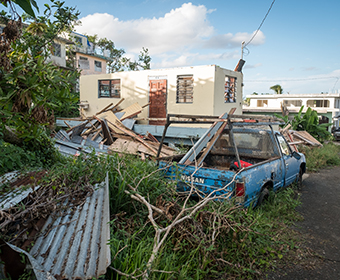
Researchers estimate a 1678 percent (17 times) higher death toll from Hurricane Maria than previously thought.
(Aug. 2, 2018) -- The number of people who died as a result of Hurricane Maria -- which hit Puerto Rico on September 20, 2017 -- may be as high as 1,139, surpassing the official death count of 64, according to researchers.
Jeffrey T. Howard ’14, an alumnus of The University of Texas at San Antonio (UTSA) who joins the faculty this month in the Department of Kinesiology, Health and Nutrition, and Alexis Raúl Santos-Lozada ’15, a UTSA alumnus and assistant professor of human development and family studies, at Pennsylvania State University, University Park, worked together on the study, published today in the Journal of the American Medical Association.
Due to differences in calculation methods, there have been various estimates of the number of deaths in Puerto Rico from Hurricane Maria.
The official government death count has remained at 64 since December 2017, and includes primarily deaths in which documentation of “hurricane-related” as the cause of death appears on the individual's death certificate.
Using death counts from vital statistics records, Santos-Lozada and Howard calculated death counts in Puerto Rico from January 2010 through December 2017. That data was used to come up with an average number of expected deaths for each month.
Researchers compared death counts from September through December 2017, following Hurricane Maria, and they estimate the number of hurricane-related deaths in Puerto Rico through December 2017 was 1,139 not 64. The researchers say that estimate is conservative.
Santos-Lozada and Howard took into account deaths directly tied to the hurricane and those in the following months from infectious disease outbreaks or lack of services like electricity, water and medical care.
Howard is hopeful this research can be used by government officials and emergency management personnel to better prepare regions for future disasters.
“This research is significant because accurate estimates of deaths from environmental disasters are important for informing rescue, recovery and policy decisions,” said Howard.
Howard specializes in epidemiology and demography, trauma research and health disparities. He earned his Ph.D. in Applied Demography from the UTSA College of Public Policy.
Read the study.
Learn more about the College of Education and Human Development.
Learn more about Department of Kinesiology, Health and Nutrition.
Connect with UTSA online at Facebook, Twitter, YouTube, Instagram and LinkedIn.
UTSA Today is produced by University Communications and Marketing, the official news source of The University of Texas at San Antonio. Send your feedback to news@utsa.edu. Keep up-to-date on UTSA news by visiting UTSA Today. Connect with UTSA online at Facebook, Twitter, Youtube and Instagram.
This event will acknowledge graduating seniors from the McNair Scholars program at UTSA before inducting the new cohort of scholars into the program.
North Paseo Building (NPB 5.140), Main CampusAt this memorable celebration, UTSA graduates will be introduced one-by-one to cross the stage and accept their doctoral degrees.
Arts Building Recital Hall, Main CampusRoadrunner Walk is an event for graduating students to have a memorable walk on campus to celebrate an important milestone and their achievements. Graduates will walk along the Paseo while being celebrated by the UTSA community, friends, and family members.
Student Union Paseo, Main CampusCelebrate the accomplishments of College of Education and Human Development, College for Health, Community and Policy, College of Sciences and University College.
Alamodome, 100 Montana St.Celebrate the accomplishments of Alvarez College of Business, College of Liberal and Fine Arts and Klesse College of Engineering and Integrated Design.
Alamodome, 100 Montana St.The University of Texas at San Antonio is dedicated to the advancement of knowledge through research and discovery, teaching and learning, community engagement and public service. As an institution of access and excellence, UTSA embraces multicultural traditions and serves as a center for intellectual and creative resources as well as a catalyst for socioeconomic development and the commercialization of intellectual property - for Texas, the nation and the world.
To be a premier public research university, providing access to educational excellence and preparing citizen leaders for the global environment.
We encourage an environment of dialogue and discovery, where integrity, excellence, inclusiveness, respect, collaboration and innovation are fostered.
UTSA is a proud Hispanic Serving Institution (HSI) as designated by the U.S. Department of Education .
The University of Texas at San Antonio, a Hispanic Serving Institution situated in a global city that has been a crossroads of peoples and cultures for centuries, values diversity and inclusion in all aspects of university life. As an institution expressly founded to advance the education of Mexican Americans and other underserved communities, our university is committed to promoting access for all. UTSA, a premier public research university, fosters academic excellence through a community of dialogue, discovery and innovation that embraces the uniqueness of each voice.